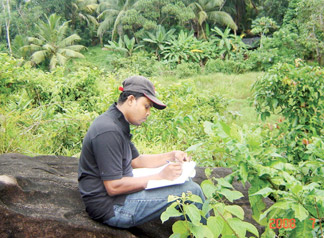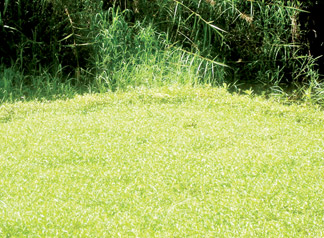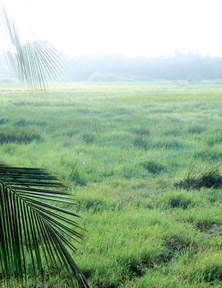|
Govt committed to improve tourism industry:
Dedduwa wetlands turn tourist destinations
By Mohammed Naalir
Tourism has started to bloom in the country resulting with the
elimination of the LTTE. The Sri Lanka Tourism Development Authority
(SLTDA) has identified several tourism destinations in the country
including Dedduwa. The tourism industry will turn into one of the main
income earning sectors by 2016. The Economic Development Ministry has
taken all possible efforts to achieve this goal.

A sketch of the water retention area.

Research officers at the proposed resort project site. |
The Government is committed to protect the wetlands while improving
the tourism industry.
Wetlands in Sri Lanka have been adversely affected by human
activities such as unauthorised filling, garbage disposal, pollution due
to discharge of effluents and clearing of natural vegetation such as
mangroves.
Until the recent past the wetlands remained as "wastelands" that
could be reclaimed or changed for use by man at his convenience without
considering the sustainable existence. However, people have now
understood the importance of the wetlands which provide a resource base
for plants, animals and human.
The environmental authorities have taken steps to preserve the
wetlands of the country.
The Dedduwa Wetland is stunningly beautiful and consists of lakes,
irrigation canals and abandoned paddy fields. It is rich in
biodiversity. Diverse vegetation such as mangroves, fauna, different
kinds of fresh water fish, mammals and reptiles, Python, mollusk,
crocodiles, aquatic birds such as herons and egrets, water fowls,
kingfishers, cormorants, butterflies and dragon flies and other native
birds in the region could be seen in the Dedduwa resort area.
The famous Bawa Gardens is located within the Dedduwa area and it
adds international recognition to the area. Several old temples are also
located in and around the Dedduwa village and cultural festivals are
conducted by the respective temples. The festivals expose the cultural
and heritage values of the area.
Fisheries and agriculture are the main livelihood mode of the people
in the area. After the establishment of the Bentota Beach Holiday
Resort, tourism has become the major livelihood mode of the people.
Tourism authorities are keen to develop the Dedduwa wetlands into a
tourist destination as the biggest tourist beach is located in close
proximity to the Dedduwa Wetlands. As a result the attempt to promote
the tourism industry will be easy. The people in the area will benefit
immensely with the implementation of Dedduwa Lake Resort Tourism
Project, a spokesperson for SLTDA said.
A large number of people in 18 Grama Niladari Divisions in the
Bentota Divisional Secretariat Division will receive direct and indirect
employments with the implementation of the project.
Dedduwa is located in the Bentota Divisional Secretariat Division.
The Division has a population of 53,550 consisting 12,685 families.
The Dedduwa Lake Resort Tourism project comprises 15 Grama Niladari
Divisions with 4297 families living in the zone. No residences in the
area have been designated for the tourism project.
The Dedduwa Lake is located about 42 miles to the south of Colombo in
the northern border of the Southern Province, 2 miles along the Bentota
River. The lake itself, a branch of the Bentota River is 520 acres in
extent and is divided by the Bentota-Elpitiya Road. The project area
which is about 4,000 acres includes the Dedduwa Lake, Manawathu Lake,
the canal systems, marshes and low-lying areas and part of high ground.
This land area comes within the administration of the Bentota DS
Division.
The Dedduwa lake provides a good water retention area when the water
level of the Bentota River increases. There is a high tendency for salt
water intrusion during the dry seasons and leads to problems pertaining
to low lying agriculture.
Salt Water Exclusion (SWE) structures have been constructed in
several places in the lake and canals to prevent this occurrence.
There are home gardens, private residences, a few restaurants and
guest houses on the west bank of Lake 1. Their customers are mostly from
the Bentota resort and travel by motorised boats along the Bentota
River. The East bank is bordered by mangroves with a gravel track
running parallel up to the Bentota River facing the Olewa Duwa. On the
Eastern side of the gravel track is marsh land, private residences, a
boutique type villa, home gardens, paddy cultivation, cinnamon and
coconut cultivation.
|

Dedduwa lake resort tourism development project map. |
An interesting feature is the vast paddy cultivation, presently in
progress despite it being close to the river. Honduwa (Island 2) and
Appala Duwa are located in Lake 2. Honduwa is 18 acres in extent and
visible from the Bentara-Elpitiya Road. It is covered with forest.
Appala Duwa is a privately owned island, 4 acres in extent. The waterway
between Appala Duwa and the mainland has been blocked due to the thick
marsh and mangrove forest and one could walk across the water logged
terrain to the island.
An unobstructed and wide view of Lake 2 and its surroundings could be
seen from the Bawa garden located on a hillock on the eastern bank of
the lake. It is an extremely charming view with the lake, Honduwa Island
and the marsh land in the background. The Bawa Foundation maintains
Island 2 and has created a nature trail. It is located on a 25 acre land
area and tourists from Bentota and Beruwela visit the area.
A medium range guest house is being constructed close to Bawa gardens
and is expected to be completed soon. A footpath is available through
the Bawa garden and the guest house area to Appala Duwa. The gap between
the two islands has been filled up and a peninsula formed. Some parts of
the footpath are filled with water but yet one could cross over to the
Appala Duwa due to the thick vegetation.
In addition to the three islands, there are two other islands at the
entrance to the lake in the Bentota River. Olewa Duwa is a fairly large
island, in a 30 acre extent with a thick forest cover. Rapiyel Duwa is 4
acres in extent and north of Olewa Duwa. Lake 3 is connected to Lake 2
by canals running through marshy land. Paddy cultivation has been
attempted in parts of the area but does not appear to have been
successful due to salt water intrusion. However there are patches of
reed cultivation.
 |
|
A beautiful place along the
project site. |
 |
|
A natural vegetation along
the project site. |
The project boundaries could be divided into four zones to guide
development activities, minimise environmental impact and enhance the
tourism potential, the spokesperson said.
He said "Tourism attractions such as Lunu Ganga and natural lake
surroundings have been located outside the project boundaries.
"According to the Conceptual Plan of the Dedduwa Lake Resort prepared
by SLTDA, a wide range of activities and facilities including eco-nature
and eco-tourism have been identified," he said.
The Dedduwa tourism area is gifted with many natural attractions such
as inland lakes wetlands, flora and fauna, diverse biodiversity,
eco-systems, beaches in the neighbourhood, temples, villages, cultural
activities and paddy and cinnamon cultivation.
The Conceptual Plan has identified tourism activities such as,
boating, fishing, bird watching, cycling, camping, golf, nature or
village walks, agro-tourism and water sports.
The proposed tourism facilities include, water bungalows, chalets,
floating rooms, camping tents, observation tower or decks, cinnamon
museum, amusement park, floating restaurants, ayurvedhic spa and
souvenir shops.
Diverse recreational facilities will be developed in the Dedduwa lake
resort tourism area such as nature walks and recreation, services,
demonstration and educational, exclusive development-both in land and
water, wetland associated development-wetland frontage, water based
development and enhancement of the environment and its protection, the
spokesmen said.
 |
|
A beautiful abandoned paddy
field. |
Water based Recreation activities will include boating in the
"Bentota River" (motorised), boating in "Lake 1" (non motorised),
angling in "Lake 2", boating in canal network (non motorised) and
boating in the "Lake 3" (non motorised)
Nature walks and recreation consist of nature trail in Island 1,
Island 2 ("Honduwa"), the wetlands and Mangrove Forests, bird watching
huts in and around the wetland and mangroves and exclusive camping in
"Highland 1".
Services, Demonstration and Educational consist of demonstration
sites for aquaculture practices in "Lake 2", demonstration sites
developed for paddy cultivation, cinnamon cultivation, peeling and oil
extraction and other cultivation.
Ayurveda spa or indigenous medicine facilities comprise education
centres to educate people on agro-tourism.
Exclusive development (both land and water) will include villas with
individual swimming pools, water chalets in and around "Lake 3" (East
bank) and security fencing with a buffer zone- around the area.
The maximum number of rooms that could be allowed within the project
area is limited to 100. The distribution of unit-type may vary depending
on the proposal and the mitigation measures to minimise the impact on
environment.
|



